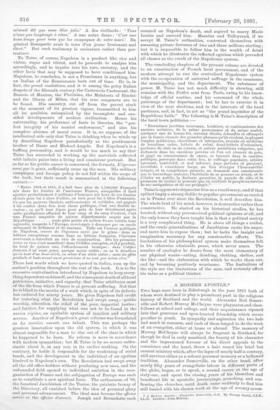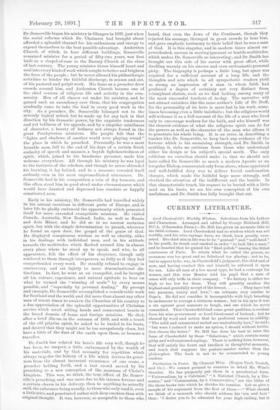A MODERN APOSTLE,*
Two boys were born in Edinburgh in the year 1813 both of whom were destined to play a prominent part in the religious history of Scotland and the world. Alexander Neil Somer- ville and Robert Murray McCheyne were playmates and class. fellows at school and college, and their acquaintance ripened into that generous and open-hearted friendship which seems peculiar to youth. In sympathy and aspiration the two lads had much in common, and each of them longed to do the work of an evangelist, either at home or abroad. The memory of Murray MeCheyne will always be fragrant in Scotland, for though he died in early manhood, the beauty of his character and the impassioned fervour of his direct appeals to the conscience and the heart, threw a halo round his brief but earnest ministry which, after the lapse of nearly half-a-century, still survives either as a solemn personal memory or a hallowed tradition. Alexander Somerville, on the other hand, after nearly fifty years of evangelistic labour in different parts of the globe, began, so to speak, a second career at the age of
,
sixty-one, and spent the closing years of his blameless and beneficent life in apostolic journeyings preaching, and con- firming the churches, until death came suddenly to find him still busied with his chosen work at the age of seventy-seven: • A Moder* AposGo : Somorville, D.D. By George Smith, 01.E., LL.D. London Jan Murray. Dr. Somerville began his ministry in Glasgow in 1837, just when the social reforms which Dr. Chalmers had brought about afforded a splendid channel for his enthusiasm and energy to expend themselves to the best possible advantage. Andereton Church, of which, in four different buildings, Somerville remained minister for a period of fifty-two years, was first built as a chapel-of-ease to the Barony Church at the close of last century. The young minister threw himself heart and. soul into every kind of work which sought to better and brighten the lives of the people ; but he never allowed his philanthropic activities to hinder the faithful discharge, in season and out, of his pastoral and pulpit work. His fame as a preacher drew crowds around him, and Anderston Church became one of the chief centres of religious life and activity in the corn- -munity. Men of all classes sat under his ministry, and he gained such an ascendency over them, that his congregation gradually came to take the lead in every good work in the city. As a preacher, Dr. Somerville belonged not to the severely logical school, but he made up for any lack in that direction by his dramatic power, by the exquisite tenderness and yet boldness of his appeals, and by a singular saintliness of character, a beauty of holiness not always found in the great Presbyterian ministers. His people felt that the
lights and shadows of another world were playing round" the place in which he preached. Personally, he was a most loveable man, full to the end of his days of a certain frank audacity of speech and manner, a boyish lightheartedness of spirit, which, joined to his handsome presence, made him weleome everywhere. All through his ministry he was loyal to the instincts of the scholars, and though he never obtruded his learning, it lay behind, and in a measure revealed itself artlessly even in his most unpremeditated utterances. Dr. Somerville had in his composition a vein of dry humour, and this often stood him in good stead under circumstances which would have daunted and depressed less resolute or happily constituted men.
Early in his ministry, Dr. Somerville had travelled widely in his annual vacations in different parts of Europe, and in later life he gladly embraced the opportunity which presented itself for more extended evangelistic missions. He visited Canada, Australia, New Zealand, India, as well as Russia and Asia Minor, and he did so in no narrow sectarian spirit, but with the simple determination to preach, wherever he found an open door, the gospel of the grace of God. He displayed conspicuous wisdom as well as charity, alike in his dealings with individual men, and in his attitude towards the multitudes which flocked around him in almost -every place where he stood up to speak, and who, to all appearance, felt the effect of his eloquence, though only rendered to them through interpreters, as fully as if they had comprehended every word. He steadily refused to engage in controversy, and sat lightly to mere denominational dis- tinctions, in fact, he went as an evangelist, and be brought all his culture, experience, and natural aptitude to bear on what he termed the "winning of souls" by every means possible, and "especially by personal dealing." By precept and example, Dr. Somerville accomplished a considerable work for Scotland and the world, and did more than almost any other -man of recent times to awaken the Churches of his country to a due appreciation of the splendid opportunities a Christian service which await willing hands and consecrated hearts in the broad domain of home and foreign missions. He died, after a brief illness, in the autumn of 1889, and with a touch of the old pilgrim spirit, he asked to be buried in his boots, and desired that they might not be too scrupulously clean, but have a little of the dust of the earth upon them, as became a traveller.
Dr. Smith has related his hero's life very well, though he lias been, we suspect, a little embarrassed by the wealth of his materials, and by that necessity for repetition which always impedes the history of a life which derives its great- ness from the almost incessant recurrence of one scene, a preacher holding forth, and a vast crowd moved by his preaching to a new conception of the nearness of Christ's kingdom. This was, we think, the true effect of Dr. Somer- ville's preaching, and was more due to his intense fervour and a certain charm in his delivery, than to anything he actually said, the substance being usually, to those who only read it, even a little trite, and penetrated rather with deep emotion than with original thought. It was, however, so acceptable to those who heard, that even the Jews of the Continent, though they rejected his message, thronged in great crowds to hear him, and gave emphatic testimony to their belief that he was a man of God. It is this singular, and in modern times almost un- precedented, success in moving ignorant or hostile multitudes, which makes Dr. Somerville so interesting ; and Dr. Smith has brought out this side of his career with great effect, while dwelling warmly on his sincere and even enthusiastic personal piety. The biography is perhaps a little long, but space was required for a sufficient account of a long life, and the thoughts and acts which to all sympathetic readers yield so strong an impression of a man in whom faith had produced a degree of certainty not very distinct from triumphant elation, such as we find lacking among many of the most successful teachers of to-day. The narrative will not attract outsiders like the same author's Life of Dr. Duff, for the personality of its hero is more lost in his work, some- times becoming even a little indefinite ; but the religious world will welcome it as a full account of the life of a man who lived only to encourage workers for the faith, and who himself was the clearest evidence of what the religious spirit can do for the powers as well as the character of the man who allows it to penetrate his whole being. It is an error, in describing a teacher like Dr. Somerville, to keep back any evidence of the fervour which is his sustaining strength, and Dr. Smith, in avoiding it, risks no criticism from those who understand either his design or his subject's special merit. The only criticism we ourselves should make is, that we should not have called Dr. Somerville so much a modern Apostle as an irregular Bishop, consecrated only from above, whose appointed and well-fulfilled duty was to deliver fervid confirmation charges, which made the faithful hope more strongly, and rivetted the attention of the indifferent and the hostile. In that characteristic touch, his request to be buried with a little mud on his boots, we see his own conception of his own usefulness, and Dr. Smith has fully brought that out.







































 Previous page
Previous page